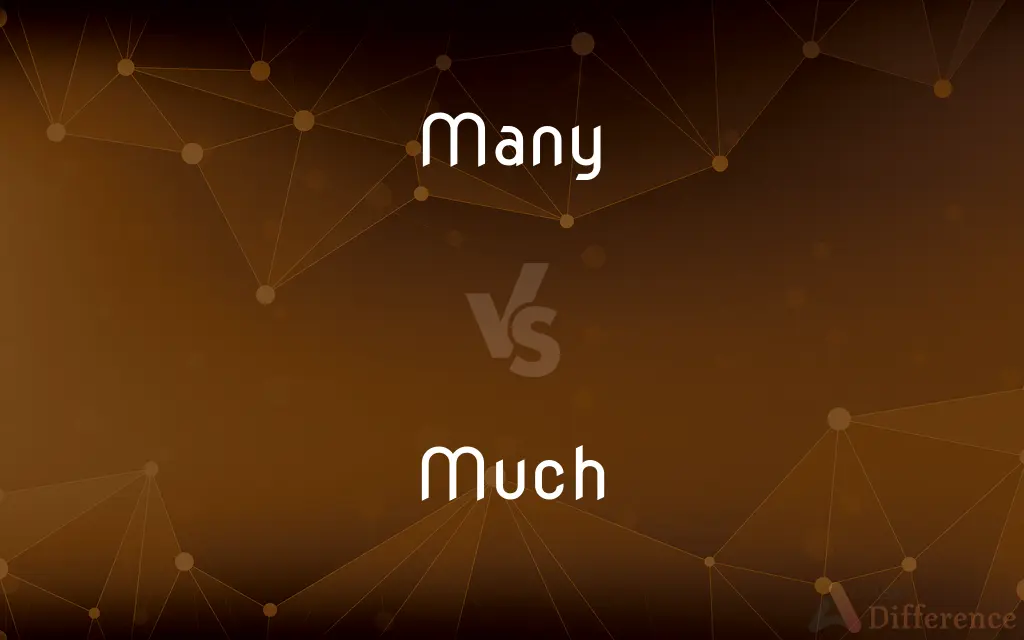Many vs. Much — What's the Difference?
Edited by Tayyaba Rehman — By Fiza Rafique — Updated on October 13, 2023
"Many" is used with countable nouns to indicate a large number, while "Much" is used with uncountable nouns to indicate a large quantity.

Difference Between Many and Much
Table of Contents
ADVERTISEMENT
Key Differences
Many is commonly utilized to describe an abundant quantity of specific, countable items. Much, on the other hand, describes a significant volume or degree of an uncountable noun.
A clear distinction lies in that Many applies to items that can be enumerated. Much, conversely, is pertinent to unquantifiable nouns or those without a plural form.
In questions and negative sentences, Many is regularly employed to inquire or negate the abundance of countable entities. Much assumes a similar role, though exclusively for uncountable items.
Many is aptly used in affirmative sentences with the intention to underscore plenty, often found in formal contexts. Much is somewhat restricted in positive statements, typically preferring informal settings.
Notably, Many can singularly stand to denote a large number, whereas Much requires an accompanying noun or specification to convey clear meaning in a sentence.
ADVERTISEMENT
Comparison Chart
Type of Nouns
Countable
Uncountable
Usage in Questions
Common (e.g., How many apples?)
Common (e.g., How much water?)
Usage in Negative Sentences
Common (e.g., Not many apples left.)
Common (e.g., Not much water left.)
Usage in Positive Sentences
Frequent (e.g., Many students passed.)
Less frequent, often informal context
Standalone Usage
Possible (e.g., Many are called.)
Requires a noun (e.g., Much was lost.)
Compare with Definitions
Many
Many indicates a large number.
Many people attended the concert.
Much
Much can suggest a high degree.
She has much talent in painting.
Many
Many is usable in positive/negative sentences.
Many opportunities were lost.
Much
A large amount
I didn't get much sleep that night
They must bear much of the blame
I did so much shopping
He does not eat much
Many
Many can suggest more than expected.
Many mistakes were made in the report.
Much
A large amount
I didn't get much sleep that night
They must bear much of the blame
He does not eat much
I did so much shopping
Many
Many is used with plural countable nouns.
Many cars were in the parking lot.
Much
To a great extent; a great deal
Thanks very much
They look much better
Did it hurt much?
They did not mind, much to my surprise
Many
Amounting to or consisting of a large indefinite number
Many friends.
Much
Great in quantity, degree, or extent
Not much rain.
Much affection.
Many
Being one of a large indefinite number; numerous
Many a child.
Many another day.
Much
A large quantity or amount
Much has been written.
Many
The majority of the people; the masses
"The many fail, the one succeeds" (Tennyson).
Much
Something great or remarkable
The campus wasn't much to look at.
Many
A large indefinite number
A good many of the workers had the flu.
Much
To a great degree or extent
Much smarter.
Many
An indefinite large number of.
Not many such people enjoyed playing chess.
There are very many different ways to cook a meal.
Much
Just about; almost
Much the same.
Many
(in combinations such as 'as many', 'so many', 'this many') Used to indicate, demonstrate or compare the number of people or things.
We don't need this many bananas. Put some back.
There may be as many as ten million species of insect.
I don't have as many friends as my sister does.
Much
Frequently; often
Doesn't get out much.
Many
An indefinite large number of people or things.
Many are called, but few are chosen.
Much
A large amount of.
Hurry! We don't have much time!
They set about the task with much enthusiasm.
Many
A multitude; a great aggregate; a mass of people; the generality; the common herd.
Democracy must balance the rights of the few against the will of the many.
Much
(in combinations such as 'as much', 'this much') Used to indicate, demonstrate or compare the quantity of something.
Add this much water and no more.
Take as much time as you like.
Many
A considerable number.
Much
A great number of; many (people).
Many
Existing in large number; numerous.
Much
Many ( + plural countable noun).
Many
A retinue of servants; a household.
Much
(obsolete) Large, great.
Many
The populace; the common people; the majority of people, or of a community.
After him the rascal many ran.
Much
(obsolete) Long in duration.
Many
A large or considerable number.
A many of our bodies shall no doubtFind native graves.
Seeing a great many in rich gowns.
It will be concluded by many that he lived like an honest man.
He is liable to a great many inconveniences.
Much
To a great extent.
I don't like fish much. I don’t much care for strawberries either.
He is much fatter than I remember him.
He left her, much to the satisfaction of her other suitor.
That boyfriend of yours is much {like - the same as} the others.
My English was much the worst, and I'm certainly not much good at math either.
Honestly, I can't stand much more of this.
Both candidates, who are much of an age, say much the same thing, but the youngest shows much the commoner behavior of the two.
Many
Consisting of a great number; numerous; not few.
Thou shalt be a father of many nations.
Not many wise men after the flesh, not many mighty, not many noble, are called.
Much
Often; frequently.
Does he get drunk much?
Many
A quantifier that can be used with count nouns and is often preceded by `as' or `too' or `so' or `that'; amounting to a large but indefinite number;
Many temptations
The temptations are many
A good many
A great many
Many directions
Take as many apples as you like
Too many clouds to see
Never saw so many people
Much
(in combinations such as 'as much', 'this much') Used to indicate or compare extent.
I don't like Wagner as much as I like Mozart.
Many
Many can imply a notable quantity.
Many animals inhabit the forest.
Much
(obsolete) Almost.
Much
A large amount or great extent.
From those to whom much has been given much is expected.
We lay awake for much of the night.
Much
Great in quantity; long in duration; as, much rain has fallen; much time.
Thou shalt carry much seed out into the field, and shalt gather but little in.
Much
Many in number.
Edom came out against him with much people.
Much
High in rank or position.
Much
A great quantity; a great deal; also, an indefinite quantity; as, you have as much as I.
He that gathered much had nothing over.
Much
A thing uncommon, wonderful, or noticeable; something considerable.
And [he] thought not much to clothe his enemies.
Much
To a great degree or extent; greatly; abundantly; far; nearly.
Thou art much mightier than we.
Excellent speech becometh not a fool, much less do lying lips a prince.
Henceforth I fly not death, nor would prolongLife much.
All left the world much as they found it.
Much
A great amount or extent;
They did much for humanity
Much
(quantifier used with mass nouns) great in quantity or degree or extent;
Not much rain
Much affection
Much grain is in storage
Much
To a great degree or extent;
She's much better now
Much
Very;
He was much annoyed
Much
To a very great degree or extent;
We enjoyed ourselves very much
She was very much interested
This would help a great deal
Much
(degree adverb used before a noun phrase) for all practical purposes but not completely;
Much the same thing happened every time
Much
Frequently or in great quantities;
I don't drink much
I don't travel much
Much
Much indicates a large quantity.
Much effort was put into the project.
Much
Much implies a notable volume.
Much of the milk was spilled.
Much
Much is used with singular uncountable nouns.
Much information was undisclosed.
Much
Much can express excessiveness.
He talks much about various topics.
Common Curiosities
Is "many" used in questions?
Yes, e.g., "How many cookies are there?"
Is "much" used with countable nouns?
No, "much" is used with uncountable nouns.
Is "much" often used in affirmative sentences?
Rarely, and more commonly in formal writing.
Can "much" stand alone in a sentence?
Less often and requires a context, e.g., "Much was revealed."
Does "many" denote a specific quantity?
No, it indicates a large, unspecified number.
Can "many" be used formally?
Yes, it can be used in both formal and informal English.
Can "many" be used with uncountable nouns?
No, "many" is used with countable nouns.
Can "many" stand alone in a sentence?
Yes, e.g., "Many are chosen."
Can "much" be used in questions?
Yes, e.g., "How much sugar should I add?"
What is a synonym of "many"?
"Numerous" can be a synonym.
Can "many" be used in negative sentences?
Yes, e.g., "I don't have many friends."
Can "much" be used informally?
Yes, especially in negative sentences and questions.
What is a synonym of "much"?
"A lot of" can be a synonym.
Can "many" and "much" be used interchangeably?
No, due to their distinct applications to countable and uncountable nouns.
Does "much" express an exact amount?
No, it indicates a large, imprecise quantity.
Share Your Discovery

Previous Comparison
Petulant vs. Impetuous
Next Comparison
Minuet vs. MinuteAuthor Spotlight
Written by
Fiza RafiqueFiza Rafique is a skilled content writer at AskDifference.com, where she meticulously refines and enhances written pieces. Drawing from her vast editorial expertise, Fiza ensures clarity, accuracy, and precision in every article. Passionate about language, she continually seeks to elevate the quality of content for readers worldwide.
Edited by
Tayyaba RehmanTayyaba Rehman is a distinguished writer, currently serving as a primary contributor to askdifference.com. As a researcher in semantics and etymology, Tayyaba's passion for the complexity of languages and their distinctions has found a perfect home on the platform. Tayyaba delves into the intricacies of language, distinguishing between commonly confused words and phrases, thereby providing clarity for readers worldwide.
















































